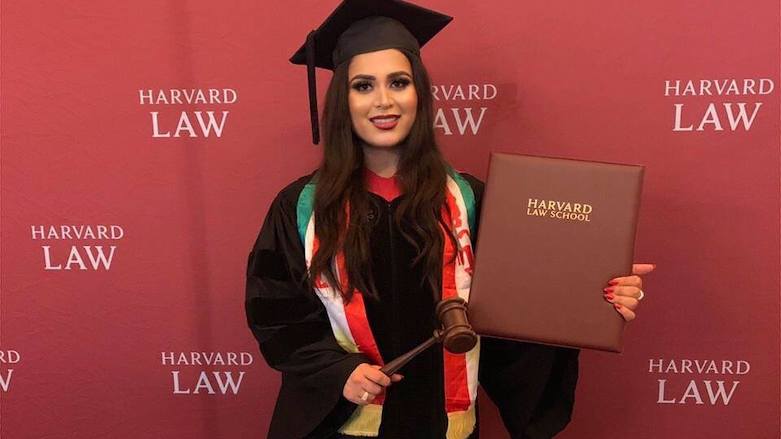Kurdish-Kiwi Impact Award winner underlines importance of education for refugees

ERBIL (Kurdistan 24) – Female Kurdish lawyer Rez Gardi last Wednesday won the New Zealand’s Global Impact Award for her work to help refugee youth gain access to quality education, and her efforts for human rights advocacy.
Congratulations to Eisenhower Youth Leader @RezGardi (New Zealand '18) - winner of the New Zealand's Global Impact Award, which celebrates young New Zealanders demonstrating leadership to support people and communities in developing countries. #efjourney https://t.co/JVuBuTSqtl
— Eisenhower Fellowships (@EF_Fellows) November 19, 2020
“It is incredibly humbling to receive the Global Impact Award,” Gardi told Kurdistan 24. “This award is not only for me, but for my family who sacrificed everything to give me a better future, it’s for my Kurdish people [who] are the world’s largest nation without a state, and it’s for the millions of voiceless refugee youth globally who drive my passion and give me purpose.”
The Global Impact Award aims to celebrate and support young New Zealanders demonstrating leadership and taking action to support people and communities beyond the nation’s shores, especially in developing countries.
Gardi is the previous 2017 Young New Zealander of The Year winner. Her family escaped Saddam Hussein’s Anfal genocidal campaign against the Kurds in the late 1980s and fled to neighboring Iran. They were recognized as refugees and resettled in Pakistan where she was born at a refugee camp in Quetta in 1991. She spent seven years of her life in Pakistan before her family received news from the United Nations High Commissioner for Refugees (UNHCR) that they were relocated to New Zealand.
She later became New Zealand’s first Kurdish lawyer, and then became the first Kurd in history to graduate from Harvard Law School.
Read More: Female Kurdish Harvard Law graduate ready to fight for rights of Kurds
Gardi is the founder of Empower, a youth-led organization that works to support refugee youth through education and leadership.
“In Pakistan, I was denied an education due to my refugee status. Now, I am a Harvard-educated lawyer fighting for refugee youth to have access to education,” she told Kurdistan 24. “Through my work, I have been able to reach over 20,000 refugee youth globally. But I could not have done it without my incredible team at Empower.”
“One of the most vivid memories I can recall is the taste of the first bottle of Coke I had at a burger joint in Pakistan in 1998 when we first were given the news that we were being resettled to New Zealand,” Gardi recalled about her experiences as a refugee. “I often picture myself sitting at that table, playing with my one-legged doll, wondering whether that little girl would have ever imagined she would have the life I live now.”
Gardi said that children are often disproportionately impacted by forced displacement. “No child should pay the cost of conflict by missing out on schooling. Yet we see generations of children unable to access education. I remember in high school I was told I ‘should consider other options’ because law school would be too difficult for someone like me: a refugee with no history of education in the family. I witnessed my older siblings and many others in my community drop out of school due to [a] lack of support for refugees.”
“This is why I founded Empower, to address the critical gap of refugee youth in education, and change those statistics. Our mission, one of the keys to success, is in having role models who look like you, having networks, and getting the right advice.”
She added that they are determined to create access for all refugee youth. “Education is pivotal to changing the future for refugees; there is no future for countries affected by conflict or other crises unless their children learn today, and receive an education that provides them the tools and skills to be empowered to make positive change.”
Gardi and the team at Empower plan to use the $5,000 from the award for project funding to support the delivery of workshops for refugee youth, many of whose studies have been severely impacted by COVID-19.
Gardi is also the Co-Founder of the Centre for Asia Pacific Refugee Studies based at the University of Auckland, and the founding member of the Global Youth Advisory Council to the UNCHR.
She is currently based in the Kurdistan Region where she works as a lawyer on cases for the prosecution of the so-called Islamic State for their targeted genocidal campaign against the Yezidis.
Editing by Karzan Sulaivany
